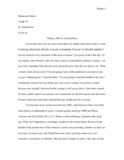| dc.description.abstract | In the past few decades, childhood vaccinations have sparked a controversy among parents. Because vaccines affect an entire community’s immunity to disease, there is a question of whether or not vaccines should be approached as any other item on the market. Parents are fighting for their right to choose how they want to protect the health of their families, but the biggest problem here is where the information they are using to form these decisions is coming from. America prides itself as a country that enforces few restrictions on its consumers, yet government mandates on vaccines contradict this freedom. This is also an issue of trust. People are beginning to question the moneymaking attitude of pharmaceutical companies who don’t seem to have the best interest of consumers in mind. Despite these issues, the evidence cannot be denied; vaccines are one of the most effective ways to keep Americans healthy. While research demonstrates that there are some down sides to vaccines, they are still the most effective way to prevent disease. Ultimately this research supports the argument that vaccines should not be treated like normal products of commerce, but instead a mandated health practice. | en_US |

